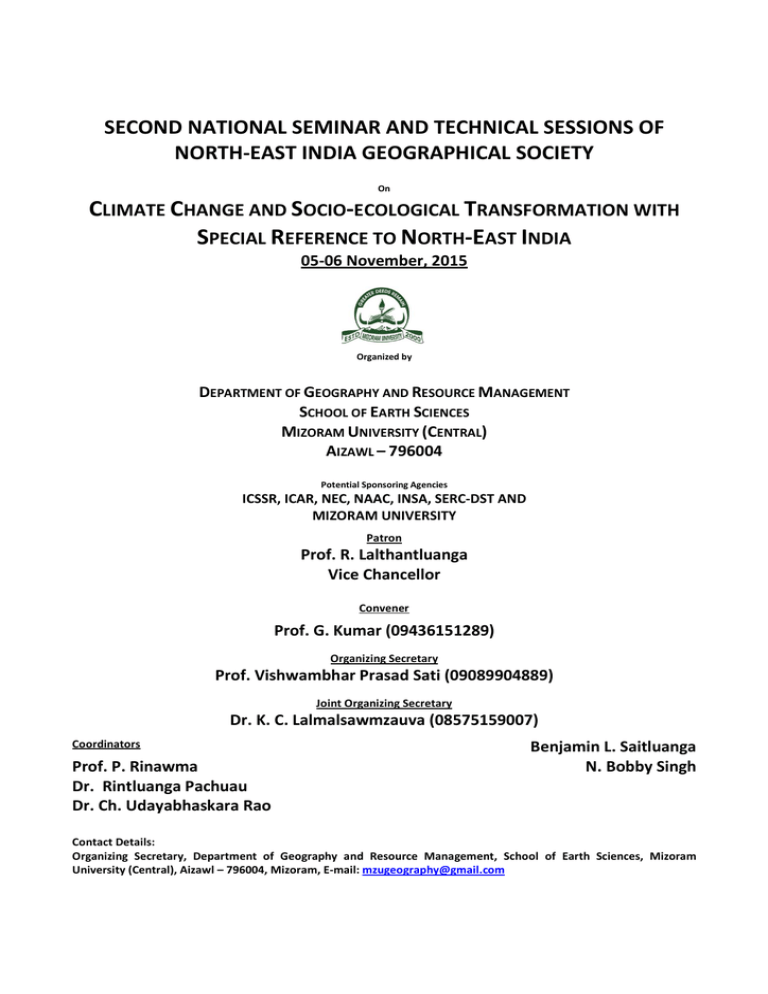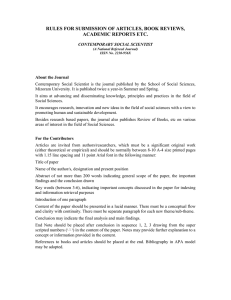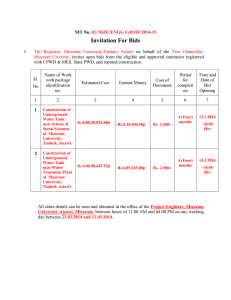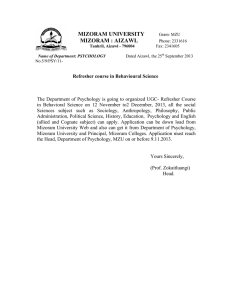C S - T
advertisement

SECOND NATIONAL SEMINAR AND TECHNICAL SESSIONS OF NORTH-EAST INDIA GEOGRAPHICAL SOCIETY On CLIMATE CHANGE AND SOCIO-ECOLOGICAL TRANSFORMATION WITH SPECIAL REFERENCE TO NORTH-EAST INDIA 05-06 November, 2015 Organized by DEPARTMENT OF GEOGRAPHY AND RESOURCE MANAGEMENT SCHOOL OF EARTH SCIENCES MIZORAM UNIVERSITY (CENTRAL) AIZAWL – 796004 Potential Sponsoring Agencies ICSSR, ICAR, NEC, NAAC, INSA, SERC-DST AND MIZORAM UNIVERSITY Patron Prof. R. Lalthantluanga Vice Chancellor Convener Prof. G. Kumar (09436151289) Organizing Secretary Prof. Vishwambhar Prasad Sati (09089904889) Joint Organizing Secretary Dr. K. C. Lalmalsawmzauva (08575159007) Coordinators Prof. P. Rinawma Dr. Rintluanga Pachuau Dr. Ch. Udayabhaskara Rao Benjamin L. Saitluanga N. Bobby Singh Contact Details: Organizing Secretary, Department of Geography and Resource Management, School of Earth Sciences, Mizoram University (Central), Aizawl – 796004, Mizoram, E-mail: mzugeography@gmail.com ABOUT THE NATIONAL SEMINAR Concern about climate change in the 21st century is believed to have necessitated an intensive study responses in terms of resilience and adaptability of mankind to his ecological settings. In spite of the fact that awareness about climate change and associated impacts on ecological niches of the biotic world has been steadily growing for some times amongst the scientific and the global community, policy attention and accordant strategies on the parts of governments are found not to have addressed the issue with compatible seriousness. The more recent rise in scientific attention to transformations in ‘life support systems of the various ecosystems’ vis-à-vis climate change has put enormous challenges to management and conservation of resources as well as to multilateral global socio-economic relations particularly in the light of attempts at maximization of human welfare at national and sub-national levels. World conservation strategies as well Agenda 21 at the Rio Conference in 1992 identified three objectives in the interest of the wellbeing of mankind: (1) maintenance of basic life support systems (food production, health and other aspects of human survival) derived from essential ecological processes ‘governed, supported or strongly moderated by ever evolving ecosystems, (2) preservation of genetic diversity to protect agrarian production system and secure investment for the future, and (3) to ensure ‘sustainable development of species and ecosystems’ – all susceptible to smallest variations in climatic conditions. Addressing the issue (s) essentially appears to be a long term policy problem. It must be realized that though riddled with uncertainties resilience and ‘governance of adaptation to climate change relies on knowledge about long term policy problem. This necessarily implies ‘multiple policy cycles’ taking into account the effects of the impacts of climate change as well as the effects of the adaptation measures in vogue. As a common responsibility, it calls for positive intervention by the governments and active participation not only of civil society and business community but also of the common man – the biggest stakeholder in any system of governance and policy formulation. It is also felt that the growing body of scientific knowledge does not by itself bring about ‘consistency in societal attention, political commitment and state intervention’. Scholars addressing the issue since early 1970s have found it to be a ‘wicked problem par excellence’ because vested interests have been leading to different problem formulations and strategies to tackle them. Paradox of approaches appears to have been instigating profound and conflicting transformations both socially and environmentally. However, our information of such transformations is limited. Still much less is our knowledge about how positive transformations may be achieved in an equitable and sustainable manner. The proposed national seminar, therefore, is aimed at reviewing the existing knowledge organization, analysis of the obtained economic conditions as well as socio-political power structure at different scalar levels. It is also expected to objectively devise methods for consensual policy and strategy formulations in the larger interest of the people at various spatial levels with particular emphasis on India and its North-Eastern states. MAJOR SUBTHEMES • • • Climate Change Theories Anthropogenic Global Warming Climate Change and Social Transformation o Population o Migration o Education o Occupation • • • Climate Change and Ecological Transformation o Changes in Land-use Pattern o Changes in Cropping Pattern o Changes in Distribution Pattern of Floral and Faunal Species o Major Water Sources and Availability of Water Climate Variability o Temperature o Rainfall o Humidity Climate Change Resilience and Adaptation ABOUT THE UNIVERSITY AND DEPARTMENT Mizoram University was established on 2nd July 2001 by the Mizoram University Act, 2000 which appeared in the Gazette of India (Extraordinary) on 25th April, 2000 as a Central University having His Excellency, the President of India as its Visitor. The objectives of the University, as laid down in the Act are "to disseminate and advance knowledge by providing instructional and research facilities in such branches of learning as it may deem fit, to make provisions for integrated courses in humanities, natural and physical sciences, social sciences, forestry and other allied disciplines in the educational programmes of the University; to take appropriate measures for promoting innovations in teachingdisciplinary studies and research; to educate and train man-power in the development of the state of Mizoram; and to pay special attention to the improvement of the social and economic conditions and welfare of the people of that State, their intellectual, academic and cultural development". Keeping these objectives in view, Mizoram University has embarked on various programmes/schemes in terms of academic and administrative development. This Department was established in 2003 under the name of Department of Geography, Tribal Culture and Resource Management. Later on, the name of the department was changed to ‘Department of Geography and Resource Management’. This department awards M.Sc. degree in Geography and total student intake is 25/semester. In addition, the department also commence Ph.D. course. It is actively engaged in developing its laboratories, GIS, Computer and Cartography and inputs specialized courses in regional planning and is intending to provide specialized courses in Remote Sensing, GIS and Computer Cartography during the 12th Plan period. Currently there are eight faculty members and four non-teaching staff in the department. HOW TO REACH AIZAWL Aizawl can be reached by Air through Kolkata/Guwahati. Connected flights are also available from Delhi, Mumbai, Chennai and Hyderabad. The MZU is approximately 20 Km away from Lengpui Airport towards Aizawl city. Pre-paid taxis are easily available from the Airport to reach the Institute. The taxi fare is Rs. 800. Silchar is the nearest railway station to Aizawl. The journey (by road) from Silchar to Aizawl takes around 6 Hrs. Sumos (share basis) are available from Mizoram Circuit House, Sonai Road, Silchar. Although, climatic conditions are very feasible throughout the year yet; the month of November is bit a cold. The sky remains clear and temperature remains between 12o and 20o C. Warm clothes are requited during morning and evening. ACCOMMODATION AND REGISTRATION FEES Accommodation will be provided free of cost in the hotels and university guest house for the outstationed participants. On the spot nominal registration fee is Rs. 600 for the faculties and Rs. 400 for the Research Scholars. SUBMISSION OF ABSTRACT AND FULL LENGTH MANUSCRIPT ABSTRACT Abstract Book of the Seminar will be published separately. The format of abstract is as follows: Title of the Manuscript (New Times Roman, font size 14, bold) followed by author (s) name, affiliation (s) and email (s) (New Times Roman, font size 11, italics). Abstract should be between 150 to 200 words comprising introduction, objective, methodology used and findings without giving headings and five key words. It should be in New Times Roman with font size 11. Abstract should be submitted through email attachment on or before 30 June, 2015, E-mail: mzugeography@gmail.com FULL LENGTH PAPER Publication of pre-seminar proceedings is proposed which will be released on the inauguration day of the seminar. The format of the manuscript should be as follows: First page – Title of paper (New Times Roman, font size 14, bold), name of author (s) affiliation (s) and email of corresponding author (New Times Roman, font size 11, italics). No abstract is required for the full length. The text will start with introduction, methods and materials, results and discussion, conclusions and references. Foot notes are highly discouraged. The manuscript should be written in New Times Roman and font size 11. Reference cited in the text and in the end should strictly be according to Harvard Referencing Style. For example: Arrami, M. & Garner, H. (2008) A tale of two citations. Nature, 451 (7177), 397-399. Barros, B., Read, T. & Verdejo, M. F. (2008) Virtual collaborative experimentation: an approach combining remote and local labs. IEEE Transactions on Education, [Online] 51 (2), 242-250 Available from: doi:10.1109/TE.2007.908071 [Accessed 29th June 2010]. Full length paper should also be submitted through email attachment only on or before July 30, 2015, E-mail: mzugeography@gmail.com


